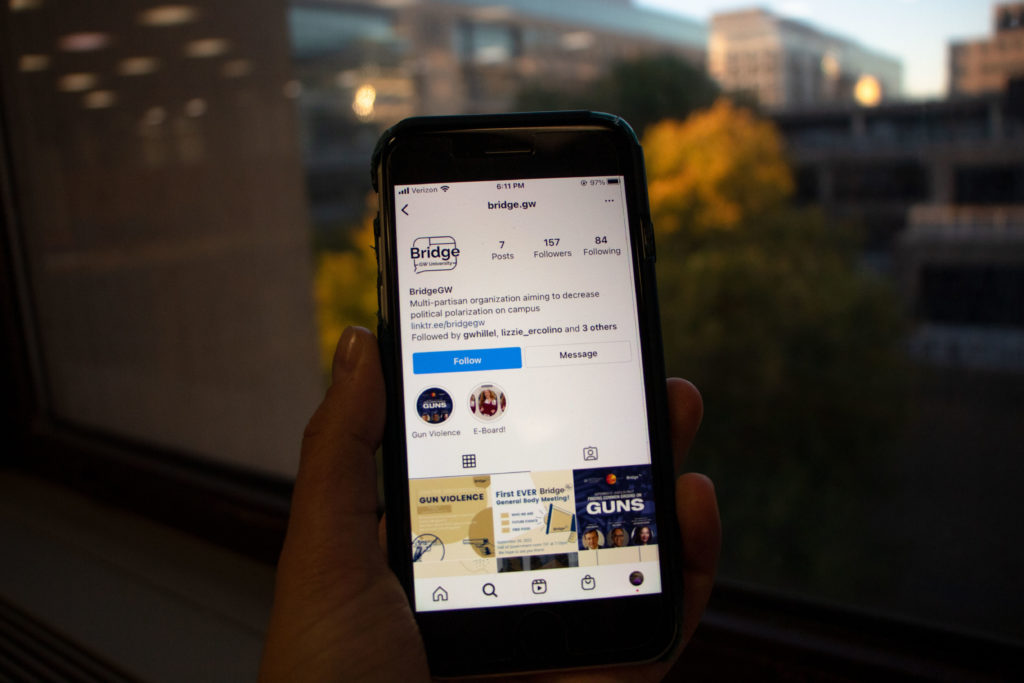A multi-partisan student organization will work to foster civil political discourse and limit polarization through moderated conversations with students and guest speakers across the political spectrum this fall.
Dedicated to combating the “toxicity” surrounding political discussions through constructive conversation, BridgeGW – a chapter of the nonprofit BridgeUSA – hopes to bring the national organization’s mission of embracing students’ political differences to GW’s campus during its first semester. BridgeGW’s leaders said the organization has nearly 100 members whom they’ve recruited since the start of the semester and plan to host discussions with students and events with speakers on topics of public interest during the upcoming year as a way to continue expanding membership.
Sophomore Manraj Multani, the president of BridgeGW, said he was motivated to bring the organization to campus as a freshman after he noticed many students unwilling to consider opinions contrasting with their own in political science classes and discussions. He said BridgeGW’s mission is to encourage all students to share their own political opinions while opening their minds to differing perspectives.
“No one wants to hear one another’s opinions, regardless,” Multani said. “And that prompted a little bit of a change, and I had an idea.”
Multani said the multi-partisan organization worked with the Nashman Center for Civic Engagement and Public Service and Common Ground Committee – a Connecticut-based nonprofit dedicated to reducing polarization – to co-host their first event this semester called “Finding a Common Ground on Guns,” with guest speakers Sen. Chris Murphy, D-CT, and former Republican Rep. Will Hurd of Texas.
Murphy and Hurd spoke to students in the School of Media and Public Affairs last Thursday about the impact that language and legislation like the Bipartisan Safer Communities Act have on gun safety issues, which was moderated by CBS News correspondent Jacqueline Adams.
Multani said BridgeGW won’t host another large-scale event like its first one until next semester, but the organization plans to hold smaller, student-led discussions biweekly driven by a specific topic. He said BridgeUSA’s national board trained the organization’s e-board members through Zoom calls over the summer to be official moderators on how to de-escalate an unruly debate.
“With the way moderation works, that I’ve been telling the executive board, how we agree on it is if one side is kind of getting really kind of blown out by an overwhelming majority, we’ll help them out,” Multani said.
Sophomore Sophie Holtzman, the co-vice president of BridgeGW, said the University approved the organization during the spring 2022 semester following a yearlong evaluation in which staff told the organization their ideas seemed “very similar” to other political organizations on campus.
Holtzman said although the University’s New Organization Committee first deferred BridgeGW’s proposal during the fall 2021 semester, BridgeGW emphasized its unique goals to promote the healthy exchange of opinions and represent all ends of the political spectrum fairly to secure the committee’s approval.
“We’re not here to take a partisan stance,” Holtzman said. “We are here to discuss and we want to leave the room as friends, and we don’t want to water down your views, and we don’t want you to be a straight ticket voter either. We want everyone to come in with their individual unique and nuanced views, and we kind of just accept you as you are, and we want to talk about it.”
Holtzman said the organization’s leaders acknowledge the difficulty of balancing partisan opinions in these discussions, but BridgeGW’s leaders feel prepared to handle contrasting opinions from their moderator training by BridgeUSA’s national board. She said the moderators guide each week’s discussion through certain questions and talking points.
“So every other week, we will have a room booked on campus and an issue picked out and we’ll have our questions picked out and kind of a map for the way that we may want the conversation to go without getting too heated,” Holtzman said.
Sophomore Sklyer Sieradzky, the communications director of BridgeGW, said the organization hopes to host biweekly discussions covering various timely and relevant topics, ranging from the change of GW’s moniker to the reversal of Roe v. Wade. She said as a continuation of its first event, BridgeGW will host a student-led conversation on gun control Wednesday, where members will discuss similar issues concerning gun violence.
Sieradzky said BridgeGW takes a “multi-partisan” approach as an attempt to create a space where everyone has a chance to express their own political opinions without the fear of backlash.
“We have the Democrats and the Republicans, but that’s a whole spectrum of people who are far left and far right and everyone in between,” Sieradzky said. “So putting just two labels on it, it’s just not enough.”
Sophomore Jacoby Sypher, the co-vice president of BridgeGW, said the organization contains numerous members from both College Democrats and College Republicans. He said the overarching message of each of these meetings is its form as a discussion, not a debate.
“A lot of us have been in a number of political organizations, both the College Democrats and College Republicans, so you have those views represented,” Sypher said. “Maybe not always an even split because GW is a liberal university, but you’ll see people on both sides, so won’t become overrun.”
Sypher said BridgeGW is open to all students who are interested in joining, regardless of political affiliation and encourages members to come with a flexible perspective to learn from others’ views.
“Come with an open mind and willingness to not only listen, but if you have something you think is important to say, feel free,” Sypher said.







